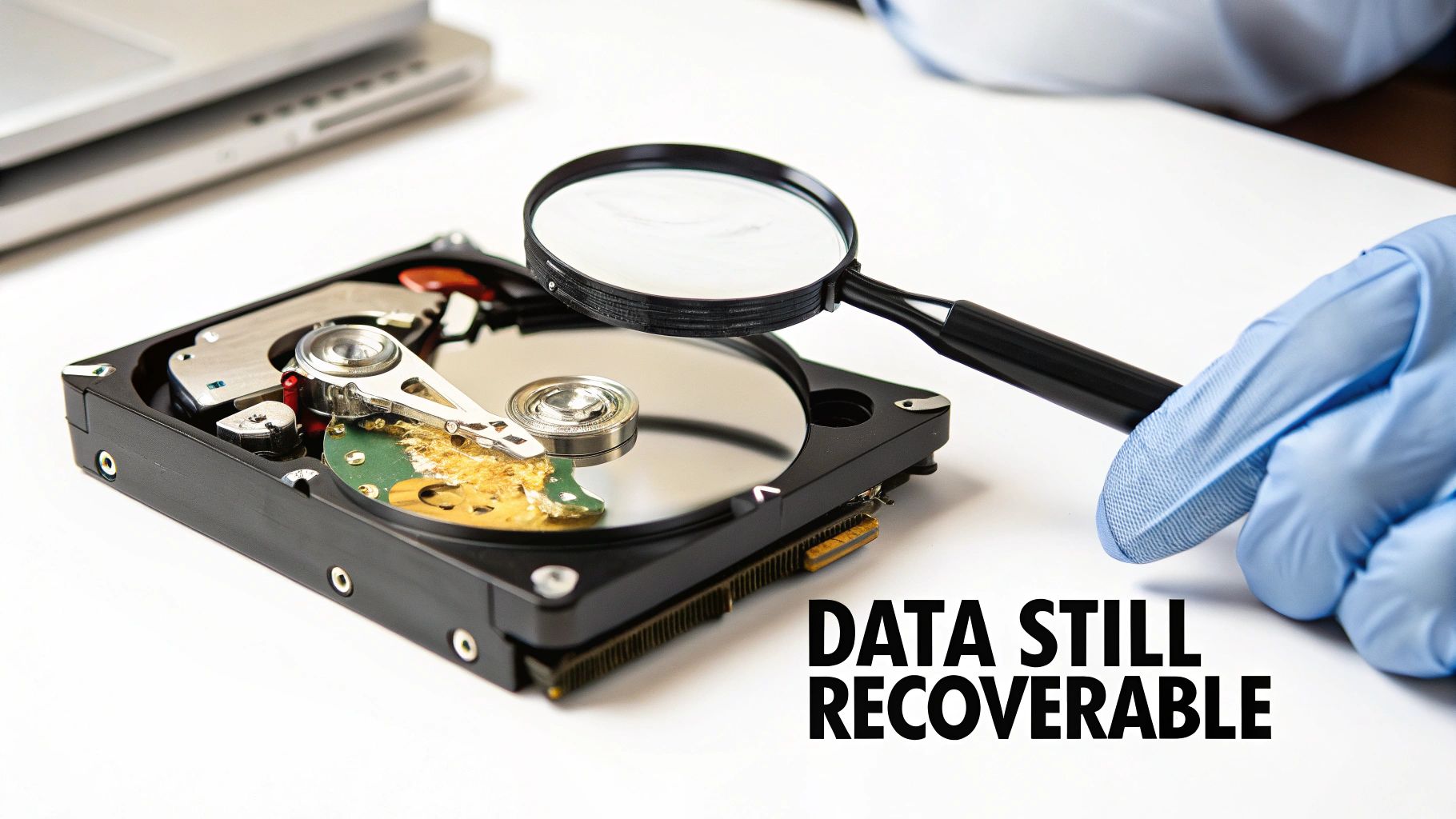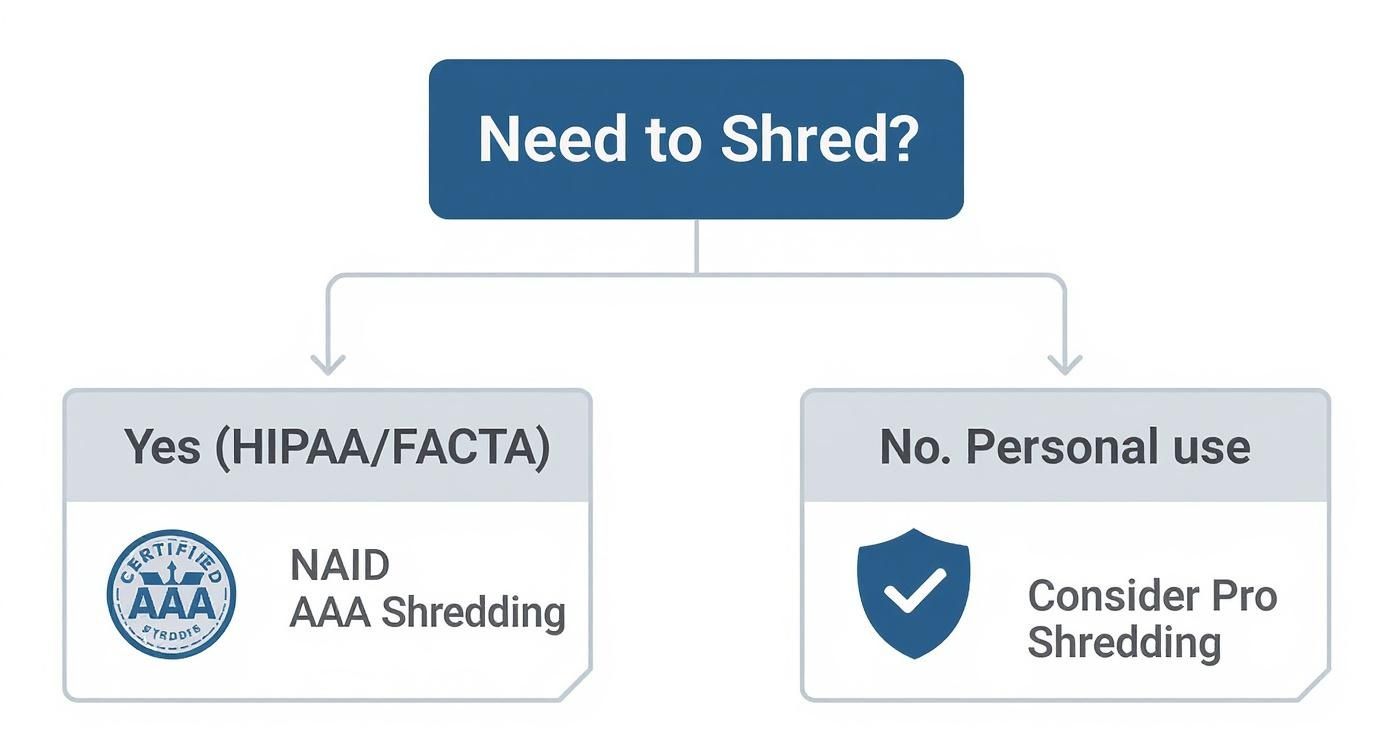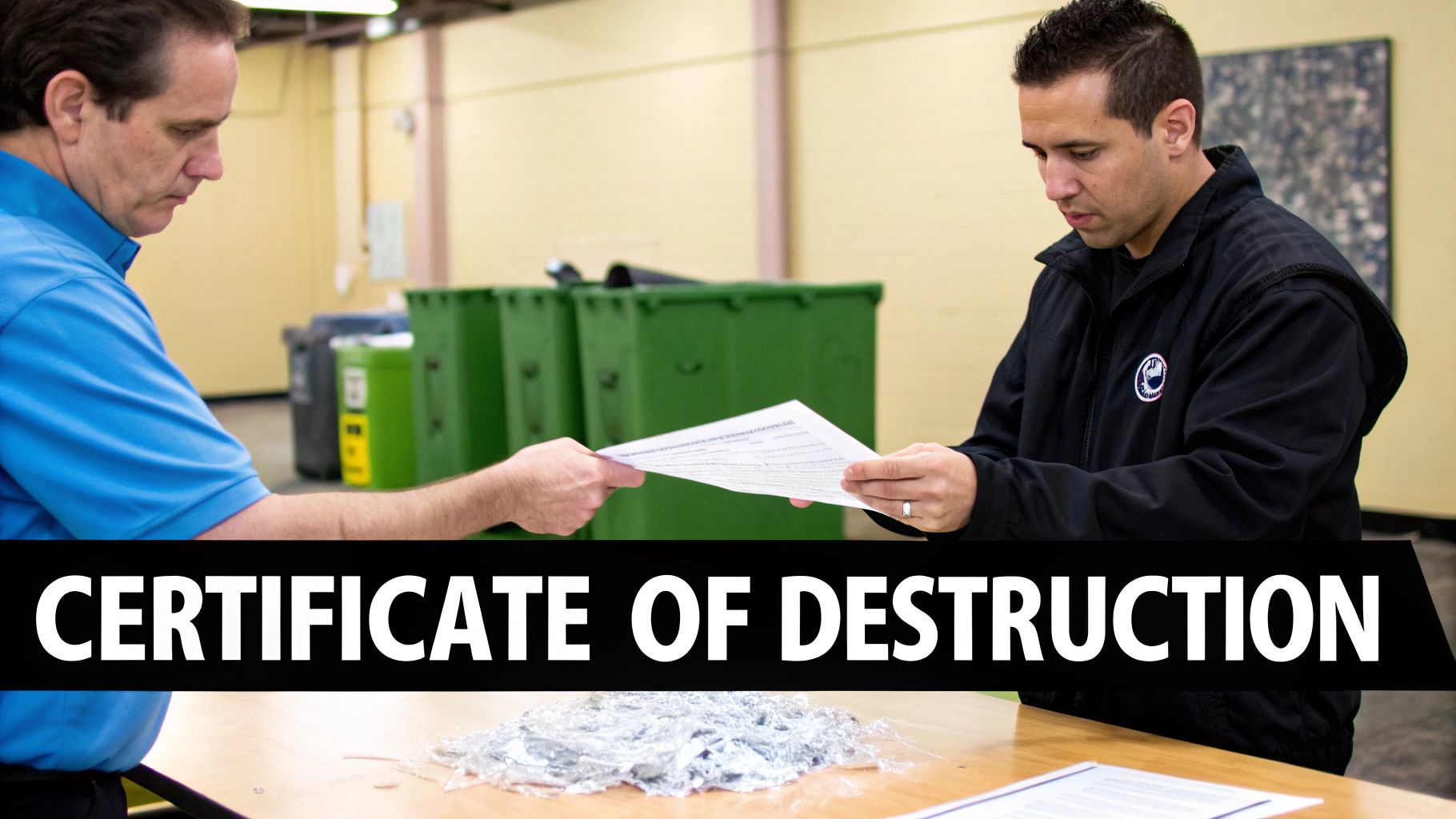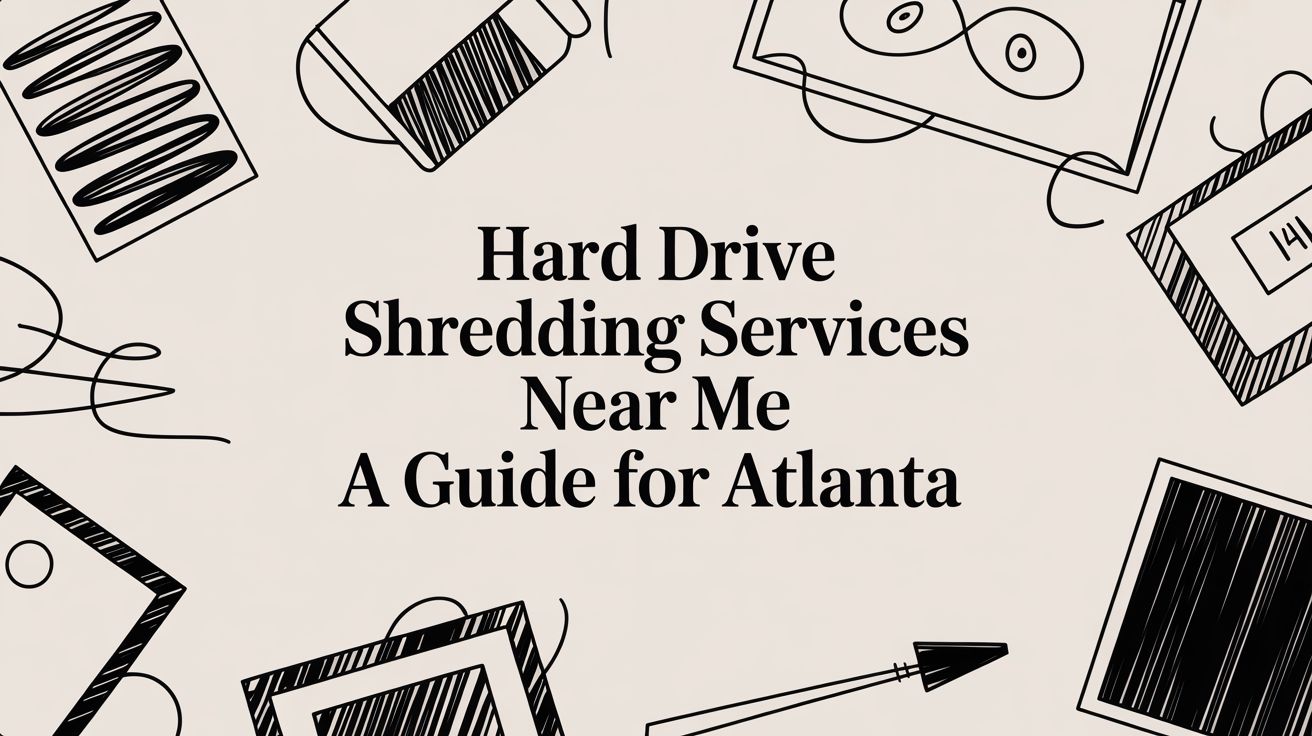You wouldn't just toss your company's financial records or your family's personal documents into the recycling bin, right? Yet, a shocking number of people do the digital equivalent every day. It's a huge mistake to think hitting 'delete' or reformatting a hard drive is the end of the story.
This is a dangerous misconception. That data is often surprisingly easy to get back with basic software, leaving sensitive personal or company information completely exposed. For any organization in Metro Atlanta, searching for "hard drive shredding services near me" isn't just a good idea—it’s an absolutely critical security step.
Why Erasing Your Hard Drive Is Not Enough

When you delete a file, you're really just removing the signpost that tells your operating system where to find it. The actual data stays put on the magnetic platters until something new gets written over it. Think of it like tearing out a page from a book's table of contents—the chapter itself is still there, waiting for someone to flip to it. For a business, this creates a massive liability.
Let’s talk real-world scenarios. Imagine a healthcare clinic in Atlanta upgrading its computer systems. If their old hard drives are just "wiped" and discarded, patient records—complete with Social Security numbers and private medical histories—could be recovered. That oversight could lead to crippling HIPAA fines, class-action lawsuits, and a reputation that’s damaged beyond repair. A small law firm could face just as devastating a loss if sensitive client information is pulled from a carelessly tossed hard drive.
The only way to be 100% certain that your data is gone for good is through physical destruction. When a hard drive is shredded into tiny, confetti-like pieces of metal, that data is impossible to reconstruct. It’s the ultimate peace of mind.
The Real-World Risks of Improper Disposal
The consequences of cutting corners aren't just theoretical. Data breaches from improperly disposed-of hardware happen all the time, leading to financial and reputational ruin. Relying on software-based wiping is a gamble because you can never be absolutely positive the process worked perfectly every single time.
Our guide on what is data sanitization dives deeper into the differences between wiping, degaussing, and the finality of physical destruction.
This growing awareness of data vulnerability is driving huge market growth. The global hard drive destruction service market was valued at USD 1.65 billion and is projected to explode to USD 5.05 billion by 2035. That's a clear sign of just how seriously businesses are taking this threat. Professional shredding simply eliminates the risk entirely.
How to Find a Trusted Shredding Service in Atlanta
A quick search for "hard drive shredding services near me" will pull up a ton of companies in the Atlanta area. But how do you go from a long list of search results to a partner you can actually trust with your most sensitive data?
Your first and most important filter should be NAID AAA Certification. This isn't just some fancy logo a company can slap on their website. It means they've passed rigorous, unannounced audits by a third party. These audits verify everything from their security protocols and employee screening to the actual destruction process. Frankly, choosing a NAID AAA Certified provider is the single best move you can make to ensure you’re dealing with a legitimate, high-security vendor.
Once you’ve narrowed it down to a few certified companies, it's time to dig a little deeper. A reputable service will be an open book about their process, especially when it comes to their chain of custody. This is just industry talk for the documented paper trail that follows your hard drives from the second they leave your office to the moment they're turned into tiny metal fragments.
Key Questions for Potential Vendors
Before you sign anything, you need clear, direct answers to a few critical questions. Don't be shy—a professional service expects and welcomes this kind of scrutiny.
- Employee Screening: Are all the employees who will handle my drives background-checked and drug-tested?
- Chain of Custody: Can you walk me through your exact procedure for securing and tracking my drives during transport?
- Witnessing Options: Do you offer on-site shredding so I can watch it happen? If not, is there a secure video feed option?
- Recycling Process: What’s your process for recycling the shredded material? How do you ensure it's handled responsibly after destruction?
The most crucial question you can ask is: "Can you provide me with a Certificate of Destruction that includes the individual serial numbers of each hard drive you destroy?" This document is your official, auditable proof of compliance and is non-negotiable for any business.
Taking the time to properly vet a vendor does more than just protect your data; it ensures you stay compliant with privacy regulations. This step is every bit as important as the physical shredding itself. For more on handling old equipment, our guide on disposing electronics near me offers some great tips on responsible e-waste practices.
Decoding Certifications and Compliance
When you're searching for a hard drive shredding service, you'll see a lot of claims. But in the world of data security, talk is cheap. Certifications are the only real proof you have that a vendor is legitimate and truly committed to protecting your sensitive information. They're what separate the pros from the pretenders.
The single most important credential you need to look for is NAID AAA Certification. This isn't just some badge a company pays for; it means they've passed grueling, unannounced audits from a third party. These auditors check everything—employee background screenings, insurance, facility security, and even the shredding equipment itself. It’s the gold standard for a reason.
Ensuring Legal and Regulatory Adherence
Beyond the certifications, getting hard drive destruction right is a matter of staying on the right side of the law. Many industries have strict data privacy regulations that spell out exactly how sensitive information must be handled, right up to its final moments.
It's critical to know how a shredding service helps you meet regulations like the HIPAA Security Rule requirements, which has specific rules about physical safeguards for patient data. One slip-up can lead to massive fines and a damaged reputation.
To help you navigate this, here’s a quick-reference table outlining the key certifications and regulations you’ll encounter.
Key Data Security Certifications and Regulations
| Certification / Regulation | What It Means for You | Industry |
|---|---|---|
| NAID AAA Certification | Verifies the highest standards for secure data destruction through surprise audits of security, employees, and processes. This is your best assurance of a vendor's quality. | All |
| HIPAA | Requires covered entities in healthcare to have a documented process for destroying media containing protected health information (PHI). | Healthcare |
| FACTA | Mandates that businesses handling consumer credit information take measures to prevent identity theft by properly destroying files and media. | Finance, Retail |
| GDPR | Grants EU citizens the "right to be forgotten," meaning companies holding their data must be able to permanently erase it upon request, even on physical drives. | Any company with EU customer data |
As you can see, these aren't just suggestions—they are serious legal obligations. Whether it's healthcare, finance, or any business handling personal data, there's no room for error.
- HIPAA (Health Insurance Portability and Accountability Act): If you're in healthcare, physically shredding drives with patient records isn't optional; it's a core part of compliance.
- FACTA (Fair and Accurate Credit Transactions Act): Financial institutions are required to destroy consumer information to shield people from identity theft.
- GDPR (General Data Protection Regulation): Even if your company is in the US, if you handle data from EU citizens, you're on the hook for its permanent erasure when requested.
The final piece of this puzzle is the Certificate of Destruction. This legally recognized document is your official proof, your audit trail, showing you did everything right to protect your data. You can learn more about why a Certificate of Destruction is so important in our detailed guide.
On-Site Versus Off-Site Shredding
When you start looking for "hard drive shredding services near me," you'll quickly find there are two main ways this gets done. The right choice really comes down to your organization's security protocols, budget, and simple logistics. Both paths lead to secure data destruction, but they're built for different priorities.
On-site shredding, which you'll also hear called mobile shredding, is exactly what it sounds like. A specialized destruction truck rolls right up to your office in the Atlanta area. This method gives you maximum transparency and a completely unbroken chain of custody.
You can literally stand there and watch your old hard drives get fed into the shredder, giving you real-time confirmation that they're gone for good. This is usually the go-to for organizations with super-strict compliance rules, like law firms, government agencies, or healthcare providers who can't take any chances with sensitive patient data.
Weighing Your Security and Convenience Needs
Off-site shredding is the other side of the coin. A secure, GPS-tracked vehicle comes to your location, picks up locked containers filled with your hard drives, and hauls them to a certified destruction facility. This is almost always the more budget-friendly option, especially if you're dealing with a massive project like decommissioning an entire corporate data center.
While you don't get to witness the shredding yourself, any NAID AAA Certified vendor follows incredibly strict rules to keep everything secure from the moment they pick it up to the final destruction.
This decision tree can help you picture which route best matches your security and compliance needs.

As the graphic shows, regulations like HIPAA often demand the kind of verifiable, certified destruction process that only professional shredding can guarantee.
Hard drive shredding physically demolishes storage devices into tiny, unsalvageable pieces, making data recovery impossible. It’s a far more secure method than data wiping, which can sometimes be bypassed. To learn more about the industry, check out this Business Research Insights report.
Key Takeaway: The question isn't about which service is "better"—it's about which one is a better fit for you. On-site offers undeniable proof of destruction, while off-site delivers a great balance of high security and cost-effectiveness for larger jobs.
Both are essential parts of a smart what is IT asset disposition strategy. Understanding these options is the first step toward making a confident decision for your business.
What to Expect During the Shredding Process

So, you’ve scheduled your hard drive shredding service. What actually happens on the big day? Knowing the play-by-play removes any of the guesswork and gives you total peace of mind that everything is handled correctly from start to finish.
The whole process kicks off when you schedule a pickup or on-site service at your Atlanta-area business. A great tip is to prep an inventory list of all the devices you need destroyed. Jotting down serial numbers is a huge help, though not always required. This little bit of prep work makes the chain-of-custody process seamless.
When our uniformed technicians show up, the first thing they'll do is check their list against yours. Every single hard drive gets scanned, creating an unbroken digital trail that follows each device from your hands to its complete destruction.
The Destruction and Documentation Phase
If you went with on-site shredding, you get a front-row seat. You can literally watch as each drive is fed into the powerful industrial shredder. For off-site services, your drives are secured in sealed, locked containers before they even leave your property, ensuring they're tamper-proof during transport to our facility.
Once every drive is destroyed, you get the most important part of the entire service: a Certificate of Destruction.
This isn't just some flimsy receipt. It's your official, legally-binding proof that you've complied with data privacy laws. It meticulously lists every drive by its serial number, confirming they were permanently destroyed according to strict industry standards like those required by HIPAA or FACTA.
What happens to the pile of metal confetti left over? All of it—the aluminum, steel, and shredded circuit boards—is sent to our certified downstream partners. They handle the responsible recycling, making sure your old e-waste is managed in an environmentally sound way. Your data is gone for good, and the planet gets a break.
To see a full breakdown, you can learn more about our entire secure hard drive shredding process.
Of course. Here is the rewritten section, crafted to sound like a human expert and match the provided examples.
Frequently Asked Questions About Hard Drive Shredding
It's one thing to understand the process, but another to figure out the practical details. You've probably got a few questions, and that's smart. Getting clear answers is the best way to move forward with confidence. Here are a few of the most common things people ask us about hard drive shredding in the Atlanta area.
How Much Does Hard Drive Shredding Cost In Atlanta?
So, what's the bottom line? While pricing can shift a bit, a good rule of thumb is somewhere between $7 and $15 per hard drive.
The final number really depends on how many drives you have and whether we come to you (on-site) or you bring them to us (off-site). On-site shredding might cost a little more, but you're paying for the convenience and the ability to watch the whole process unfold.
Keep in mind that most professional shredding companies have a minimum service fee, usually in the $100 to $200 range. This just covers the basics of getting our specialized truck and trained technicians out to your location. For a number you can actually budget with, your best bet is always to get a direct quote from a certified local provider.
Do I Need to Remove Hard Drives Myself?
Absolutely not. Look, you can definitely save a few bucks if you have the time and know-how to pull the hard drives from your old desktops, laptops, or servers. But it's not a requirement at all. Many shredding services, including ours, can handle the drive removal for you for an additional fee.
This is a lifesaver for businesses that are upgrading dozens of machines or don't have a dedicated IT person on staff. It makes sure everything is handled quickly and correctly without pulling your team away from their real jobs. Just let us know you need this service when you ask for a quote so we can factor it in.
Your Certificate of Destruction is the single most important document you'll receive. It's your official, auditable proof that every single hard drive was securely destroyed in line with privacy laws like HIPAA or FACTA. It details what was destroyed, when, and how, serving as your key compliance record.
This document isn't optional—it's your ultimate peace of mind. It confirms you've done your due diligence to protect sensitive information right up to its final, irreversible end.
Ready to protect your company's sensitive data with a certified, reliable process? Montclair Crew Recycling offers secure on-site hard drive shredding across Metro Atlanta, providing you with a Certificate of Destruction and complete peace of mind. Schedule your secure shredding service today.
